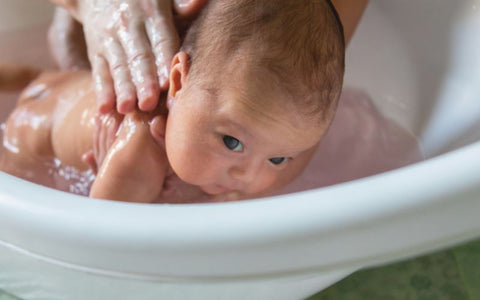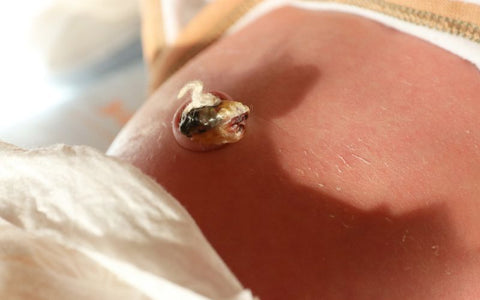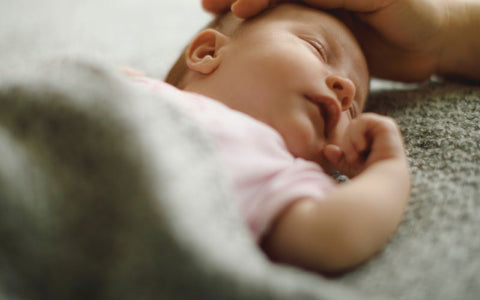
Caring for a newborn - the first days at home
Your long-awaited baby has been born. During the days spent in the hospital, you may still feel the firm support of the baby's caregivers, or you may be confused by their advice (if it contradicts what you have learned so far). Meanwhile, you are thinking more and more about the upcoming independent family life and the tasks you will have to do around the baby.
“Will I do it right?”
You are thrown into a new and perhaps previously unknown task, almost without transition, which you want to perform in an exemplary manner, with the greatest love. Every mother experiences this period differently.
To ease your worries, you should know that there are professionals, supportive healthcare networks, techniques, products, and emotional support available for any problem that may arise around your baby.
The details of newborn care in the first days could be discussed at length. In our article, we list the daily routine and the most common questions and problems. Everyone says different things, and there is a lot of contradictory information circulating on the topic. We tried to simplify it.
Feeding on demand
If for some reason breastfeeding doesn't work out and you have to give your child formula, know that the most important thing is to give it with love. And your baby will sense this.
Of course, it's worth doing everything you can to ensure successful breastfeeding. Today, you can find the right professional help for this.
Breast milk is the most ideal food for your baby. It provides long-term immune protection for your child and has countless positive effects on your baby's health and yours. That's why health experts worldwide emphasize the importance of exclusive breastfeeding for up to 6 months.
With on-demand breastfeeding, the timing and duration of breastfeeding is adjusted to your baby's needs. This method is the most natural for your baby and milk production can be adjusted to the optimal amount according to your little one's needs.
If you have any problems, contact a lactation consultant who can even visit you at home to help you and your child.
If you want to freeze breast milk for your baby, it is important to sterilize all parts of the breast pump and the storage containers daily. You can now use microwave-safe sterilizers, electric devices, or you can boil it in the traditional way.
Your newborn should also receive vitamins D and K from birth, the type and amount of which will be prescribed by your pediatrician.
From skincare to nail trimming
Your baby's sensitive skin needs special attention because it can dry out quickly. It will protect them from germs if you can maintain its moisture content and care for it in a way that respects its natural balance and is free from harmful chemicals.
Bathing and hair washing
The advantage of the recommended few minutes of gentle washing daily is that you can use clean water to free your baby's skin from dirt that could potentially irritate it.
What bath products do you choose?
Hypoallergenic baby baths with natural ingredients may be best, as babies' skin is particularly sensitive to chemicals. Some people suggest that for newborns, just adding a little olive oil or natural baby bath oil or cream to the water and washing them is more than enough.
Bathing is an experience for the whole family.

Your little one is usually quick to show their joy when it's time for their evening bath.
Pay special attention to the temperature of the water (it should be 37-37.5 degrees). You can check the temperature with a water thermometer or with the classic method of our grandparents: put your elbow in the water, and if it feels neither cold nor hot, then it's just right. What we feel is only slightly warm, the baby may feel hot, and his skin will easily turn red, as if it were burned. That's why it's important for the water to be at body temperature.
There are baby wash mitts that can help gently remove dirt, especially from the scalp, but many babies like to just wash their bodies with your hands, so they feel the touch better.
Wash your baby's hair carefully, paying attention to the hairline and smoothing it all the way through.
In the beginning, it is enough to gently cleanse your baby's skin for 2-3 minutes and gently blot the excess water with a soft bath towel without rubbing.
Make sure that the umbilical stump does not get wet! The areas behind the ears and under the chin are still difficult to reach, so pay attention to them! The foreskin of little boys should not be pulled back because it is still attached.
(We recommend that you do not let your pediatrician pull back the foreskin in the very beginning! With old habits, less good doctors have caused injuries to little boys by forcibly pulling back the foreskin, and this unfortunately still happens today. Seek professional help on this topic who follows modern, evidence-based principles and takes into account the baby's natural development.)
Don't worry about belly button care
The small 3-4 cm umbilical stump falls off in 5-10 days and is easy to care for. It is important to keep it clean and dry until it falls off on its own.

If you see that it becomes red, swollen and oozing, or if your baby has a fever, contact your pediatrician!
Official recommendations for umbilical cord care have changed a lot over the years. In the past, they said to wipe it with alcohol, and then only clean it with pharmacy salt water, because alcohol is drying. Alcohol should only be used if the umbilical cord accidentally gets dirty with feces (this can happen when the baby is lying on his stomach, if the contents of the diaper leak forward).
We wouldn't go into promoting a specific method right now, ask your midwife or pediatrician about the current recommendation! But they will probably show you in the hospital.
Choose skin-friendly products for diapering too!
Usually, every mother finds the most suitable and favorite type of diaper, wipes, and cream for her baby.
Always clean your baby's skin from front to back when changing diapers . When applying cream, only apply to the bottom and the two groin folds. The umbilical stump should not touch the edge of the diaper, but rather be folded back.
More and more people are choosing washable diapers in order to avoid waste and chemicals. Today, you can choose from countless washable diapers. If for some reason you can't decide, you can also get more chemical-free disposable diapers made from corn fiber. But washable diapers clearly have the smallest ecological footprint.
Likewise, the diaper wipe can be washable, which you just need to dip in lukewarm water and you're ready to wipe.
Sensitive areas - nail trimming and ear cleaning
Newborns' nails grow quickly. We don't cut them for the first two weeks.
You may be afraid of cutting nails , but it's actually not that difficult. You can get really good baby nail clippers, but if you prefer, you can also try using a fine nail file. It's best to do this when your baby is sound asleep, otherwise they will pull their hand away and it's easier to get hurt. Don't round the corners of the nails, as this increases the chance of ingrown nails.
The ear canal is capable of self-cleaning. Any wax that appears in the opening should be carefully wiped out with a baby cotton swab. Do not insert the swab, as this can cause damage and push the wax further into the baby's ear canal, clogging it.
Briefly about anesthesia
Sleep is very important for your baby's health. In the first few weeks, a newborn's sleep is somewhat irregular: the active REM phase and the deep non-REM phase alternate more quickly, with micro-awakenings in between.
Your baby may wake up every 2 hours in the first few months, as their sleep is mostly regulated by hunger. It is common for days and nights to mix up, which can be exhausting for you. However, this will settle down within a few weeks. Help the process along by making the night dark and quiet!
The pleasantly soft clothing is soothing and comfortable for the baby. Soft bamboo clothes help your little one sleep more restfully.

By establishing a consistent evening routine, you help him learn when it's time to sleep.
Many people today co-sleep with their babies because it helps them sleep more peacefully. However, experts see dangers in this: breathing monitors cannot be used, the baby can get under the covers, and the mother can turn over on her child at night without realizing it.
To eliminate this, baby cots have become popular. By pushing them next to the parents' bed, the little one can be very close to his mother, yet still be properly separated.
The use of a breathing monitor is recommended up to the age of 1. This allows you to immediately notice any breathing interruptions during sleep, which can be dangerous for babies at a young age.
Remember, you are still a great mom if you get your baby used to a separate bed or room from the beginning, and get up to help him when he needs to. We know that there are often heated arguments in this group of moms, but no mother is better or worse than the other. Some choose to sleep separately because they feel it serves the best interests of the family.
The important thing is that your baby feels that he can count on you when he needs you, that you are there for him when he cries.
Would you like to go outside?
If your baby was born at a normal age and weight, you can start ventilating him/her in the warm months, at 1 week of age. Following the principle of gradualness, initially open the window for only a few minutes before taking him/her outside.
Protect it from drafts, put a thin thread cap on it even in summer. Cover the stroller from the sun, as its skin is still sensitive.
When is it not recommended to take your newborn baby outside?
It is not recommended to stay outside in winter in sub-zero temperatures, rainy, foggy, humid, windy weather, and of course in summer during heat waves.
If you can, choose a quieter, more natural place to walk, so you can avoid traffic noise and inhaling exhaust fumes from cars.
Dressing
The little ones' fat pads are still thin, and their thermoregulation is underdeveloped. This should be taken into account when choosing clothes. You can tell if they're cold by the way their skin becomes marbled, their lips and nails turn blue.
We have already written in more detail about dressing a newborn , take a look!
Everyone gives you advice. Who should you listen to?
If a problem arises, helpful suggestions can come from many sources. A mother is also faced with unsolicited advice. The two grandmothers, the health visitor, the pediatrician, and the articles on the Internet all say different things...
It's worth clarifying this early on. Listen to ideas, but act at your own discretion.
Counseling and health visitor visits
You've probably been in contact with your midwife for quite some time. She's the one who will visit you regularly even after the baby is born.
While she is interested in your baby, she also has you in mind, as you may be going through difficult times: fatigue, depression, breastfeeding difficulties. Whatever you ask her, she supports your entire family.
Possible health problems in the first few weeks
There are some things that can make life difficult for a family. Of course, these don't always happen, but it doesn't hurt to be prepared.
Colic
In the case of colic , the baby has been crying for more than 3 weeks, at least 3 days a week, for 3 hours a day. It can be observed that it usually starts at the same time of day, with a more intense and straining cry than normal, accompanied by the release of intestinal gas. The pediatrician will help with appropriate medications and practices until the baby naturally outgrows the colic.
Thrush
You may see white plaque on your baby's oral mucosa, which is caused by the fungus Candida. An old, previously widely used toothbrush is no longer recommended, according to the latest research results, and can be very harmful. Be sure to ask your pediatrician for advice on safe methods to use.
Heat rash
In warm, humid environments, tiny blisters may appear on the skin, these are heat rashes . They usually disappear in airy clothes, you can prevent them by dressing your baby properly: by giving him clothes made of natural materials with appropriate layers. If the rashes do not disappear, consult a pediatrician, because in this case you will need to look for other causes and other treatment methods.
Skin peeling
It is normal for babies who are overfed to have swelling on their wrists, hands, ankles and feet. There is no need to worry about it as it usually goes away by 2 weeks of age.
Diaper dermatitis
In closed, warm, humid places, the skin turns red and rashes appear due to the combined effect of urine and feces. In order to heal, the skin must be kept dry and frequent diaper changes are necessary. Wash the skin with lukewarm water after urine and feces, and care for the skin using a high-fat, water-repellent buttock cream.
Eczema
Eczema most often refers to dry, flaky, itchy areas localized to the face. In infants and children, structural – atopic – eczema is the most common. It can be traced back to an allergic tendency, which is why it is recommended to breastfeed the baby as long as possible. You can get oil baths specifically intended for atopic skin, but it is possible that a preparation prescribed by a doctor may also be necessary. Be sure to consult your pediatrician!
BCG vaccination site
3-4 weeks after vaccination, a small red lump appears on the upper arm. After 4-6 weeks, a small blister forms in the center, which oozes, crusts, and heals with a small scar. Keep it dry and protect it from injury! If you experience unusual inflammation in this area, of course, show it to a specialist.
How can you prepare for the postpartum period?
If you want more than just reading, you can also take courses. Your health visitor can help answer your questions, or anyone in your family with whom you have a trusting relationship.
The care of premature babies and babies born with other abnormalities may be specialized. In these cases, the guidelines of the appropriate specialist are paramount.
We hope that this short summary, compiled from reliable health sources and of course our own experiences, has been helpful. Our specialty is baby dressing. Feel free to ask us about this, we will help!
































